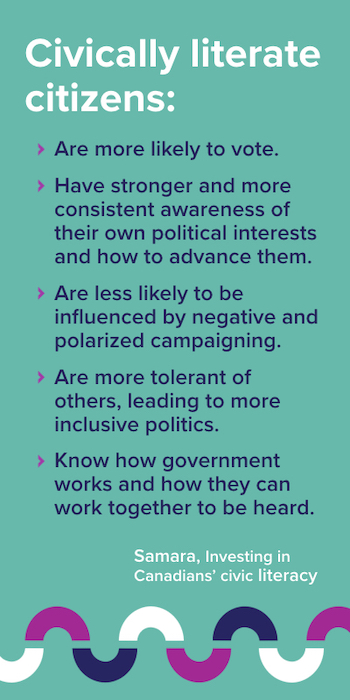What is civic literacy and why do our kids need it?
A new report – Investing in Canadians’ civic literacy: An answer to fake news and disinformation – from The Samara Centre for Democracy says that now, more than ever, we need “a politically educated and engaged citizenry.”
 According to the report, today’s massive, unrestricted flow of information – some of it false, much of it extremely biased – represents a threat to our democracy; and the only safeguard against it is an “engaged, informed, discerning, and resilient democratic public.” The report calls on Canada and the provinces to take a more coordinated and sustained approach to building civic literacy across generations.
According to the report, today’s massive, unrestricted flow of information – some of it false, much of it extremely biased – represents a threat to our democracy; and the only safeguard against it is an “engaged, informed, discerning, and resilient democratic public.” The report calls on Canada and the provinces to take a more coordinated and sustained approach to building civic literacy across generations.
Do we teach civic literacy in school?
Ontario schools teach civics in grades 9 and 10 history, geography, and civics courses. But the Samara report defines civic literacy as “the individual-level tools, skills, and knowledge that make democracy work.” The authors suggest that schools “can be hesitant to teach civic literacy today, for fear of being criticized as being too ‘political’ or ‘biased.’”
The question for all of us is: If civic literacy is about much more than how government works, then shouldn’t we be teaching it throughout the school experience, not just in a few subjects?
Building students’ capacity to have a voice, be engaged
Over the last five years, People for Education – working with experts from across Canada – defined a range of skills and competencies that are foundational for success in school and life. One of the experts, University of New Brunswick professor Alan Sears, pointed to the gaps in citizenship education in Canadian schools.
“It is unfortunate that [the] high rhetorical commitment to informed and engaged citizenship as a central educational outcome has rarely been matched by a concomitant allocation of resources or actual curricular priority.”
– Alan Sears, University of New Brunswick
Sears identified a number of core citizenship competencies that could be embedded across curriculum. However, he emphasized that citizenship education is about more than simple knowledge acquisition. It must include building students’ capacity for engaged citizenship along with their capacity to “act in ways that are consistent with democratic values.” Building that capacity requires quality learning environments that focus on student voice and encourage active engagement in the school and community.
Citizenship competencies and conditions include:
|
|
Recommendations for change
Samara’s report recommends that the federal government:
- create and fund an initiative to both identify and develop effective civic literacy programs
- develop a set of measures for civic literacy
- support greater connections between government, researchers, and organizations delivering civic literacy programming
- create a national “home” for civic literacy to facilitate exchange, collaboration, and evaluation across sectors and multiple levels of government
To support change in K to 12 education, People for Education has recommended that Ontario:
- recognize the importance of “the new basics” – competencies and skills in citizenship, creativity, health, and social-emotional learning – and embed the teaching and learning of these vital skills and competencies across curriculum
- support schools and school boards with the resources necessary to create the quality learning environments required to support students’ development of key skills and competencies.
Further reading:
